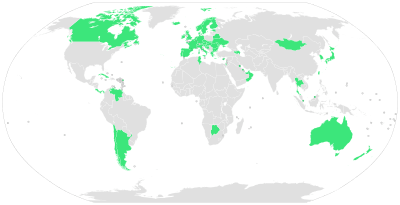Healthcare in Europe

Most European countries have universal health coverage.
>90% health insurance coverage, and
>90% skilled birth attendance.

Healthcare in Europe is provided through a wide range of different systems run at the national level. The systems are primarily publicly funded through taxation (universal health care). Private funding for health care may represent personal contributions towards meeting the non-taxpayer refunded portion of health care or may reflect totally private (non-subsidized) health care either paid out of pocket or met by some form of personal or employer funded insurance. All EU and many other European countries offer their citizens a European Health Insurance Card which, on a reciprocal basis, provides insurance for emergency medical treatment insurance when visiting other participating European countries.
The European Union has no major administrative responsibility in the field of health care. The European Commission's Directorate-General for Health and Consumers however seeks to align national laws on the safety of food and other products, on consumers' rights and on the protection of people's health, to form new EU wide laws and thus strengthen its internal markets.
Healthcare Rankings
In 2000 the World Health Organization, WHO, published its rankings of 190 of the world's healthcare systems.[2] France was ranked in 1st place worldwide. The rankings for the European countries are shown in the table below. The lowest ranking European country is Russia at 130, while the lowest ranking (current) European Union country is Latvia at 105.
| World Ranking | European Ranking | Country | % Public funding* |
|---|---|---|---|
| 1 | 1 | France | 76.9 |
| 2 | 2 | Italy | 57.1 |
| 3 | 3 | San Marino | 73.5 |
| 4 | 4 | Andorra | 86.7 |
| 5 | 5 | Malta | 58.9 |
| 7 | 6 | Spain | 90.6 |
| 9 | 7 | Austria | 67.3 |
| 11 | 8 | Norway | 82.0 |
| 12 | 9 | Portugal | 57.5 |
| 13 | 10 | Monaco | 62.5 |
| 14 | 11 | Greece | 65.8 |
| 15 | 12 | Iceland | 83.8 |
| 16 | 13 | Luxembourg | 91.4 |
| 17 | 14 | Netherlands | 70.7 |
| 18 | 15 | United Kingdom | 96.9 |
| 19 | 16 | Ireland | 77.3 |
| 20 | 17 | Switzerland | 69.3 |
| 21 | 18 | Belgium | 83.2 |
| 23 | 19 | Sweden | 78.0 |
| 24 | 20 | Cyprus | 38.8 |
| 25 | 21 | Germany | 77.5 |
| 31 | 22 | Finland | 73.7 |
| 34 | 23 | Denmark | 84.3 |
| 38 | 24 | Slovenia | 80.8 |
| 43 | 25 | Croatia | 79.7 |
| 48 | 26 | Czech Republic | 92.3 |
| 50 | 27 | Poland | 71.6 |
| 55 | 28 | Albania | 77.7 |
| 62 | 29 | Slovakia | 81.8 |
| 66 | 30 | Hungary | 84.9 |
| 70 | 31 | Turkey | 74.0 |
| 72 | 32 | Belarus | 82.6 |
| 73 | 33 | Lithuania | 75.7 |
| 77 | 34 | Estonia | 78.9 |
| 79 | 35 | Ukraine | 75.5 |
| 90 | 36 | Bosnia-Herzegovina | 92.6 |
| 99 | 37 | Romania | 60.3 |
| 101 | 38 | Moldova | 75.1 |
| 102 | 39 | Bulgaria | 81.9 |
| 104 | 40 | Armenia | 41.5 |
| 105 | 41 | Latvia | 61.0 |
| 106 | 42 | FR Yugoslavia | 64.8 |
| 109 | 43 | Azerbaijan | 79.3 |
| 114 | 44 | Georgia | 8.6 |
| 130 | 45 | Russia | 76.8 |
- as a percentage of total health expenditures
A different ranking of European healthcare systems, the Euro health consumer index, is being done by Health Consumer Powerhouse. The 2014 ranking included 37 countries measured by 48 indicators.
| Country | Overall ranking | Patient rights and information ranking | Accessibility (waiting times for treatment) ranking | Outcomes ranking | Range and reach of services provided | Prevention | Pharmaceuticals |
|---|---|---|---|---|---|---|---|
| | 1 | 1 | 7 | 1 | 1 | 13 | 1 |
| | 2 | 12 | 1 | 3 | 14 | 6 | 9 |
| | 3 | 22 | 22 | 1 | 3 | 1 | 7 |
| | 4 | 6 | 10 | 6 | 4 | 6 | 1 |
| | 5 | 2 | 4 | 9 | 6 | 13 | 9 |
| | 6 | 22 | 1 | 9 | 4 | 19 | 9 |
| | 7 | 4 | 14 | 3 | 9 | 1 | 21 |
| | 8 | 17 | 7 | 6 | 6 | 5 | 16 |
| | 9 | 10 | 7 | 3 | 21 | 6 | 1 |
| | 10 | 9 | 4 | 16 | 11 | 19 | 9 |
| | 11 | 12 | 10 | 9 | 14 | 13 | 13 |
| | 12 | 12 | 35 | 6 | 1 | 1 | 7 |
| | 13 | 6 | 14 | 14 | 21 | 19 | 19 |
| | 14 | 8 | 30 | 16 | 6 | 6 | 1 |
| | 15 | 22 | 10 | 16 | 11 | 26 | 13 |
| | 16 | 17 | 25 | 16 | 9 | 13 | 1 |
| | 17 | 4 | 3 | 33 | 21 | 6 | 21 |
| | 18 | 10 | 19 | 16 | 11 | 36 | 21 |
| | 19 | 24 | 30 | 14 | 14 | 1 | 16 |
| | 20 | 24 | 27 | 9 | 18 | 13 | 16 |
| | 21 | 15 | 10 | 25 | 24 | 19 | 13 |
| | 22 | 19 | 22 | 22 | 24 | 6 | 21 |
| | 23 | 30 | 35 | 9 | 19 | 13 | 1 |
| | 24 | 19 | 14 | 23 | 19 | 34 | 21 |
| | 25 | 30 | 19 | 16 | 30 | 26 | 19 |
| | 26 | 24 | 14 | 30 | 24 | 19 | 21 |
| | 27 | 15 | 19 | 26 | 28 | 26 | 28 |
| | 28 | 29 | 25 | 30 | 14 | 6 | 33 |
| | 29 | 36 | 22 | 23 | 31 | 19 | 21 |
| | 30 | 34 | 14 | 26 | 35 | 26 | 28 |
| | 31 | 28 | 4 | 33 | 37 | 32 | 36 |
| | 32 | 24 | 30 | 33 | 24 | 26 | 28 |
| | 33 | 19 | 30 | 26 | 28 | 37 | 28 |
| | 34 | 30 | 27 | 36 | 31 | 25 | 33 |
| | 35 | 35 | 27 | 26 | 35 | 32 | 36 |
| | 36 | 30 | 30 | 36 | 34 | 26 | 28 |
| | 37 | 37 | 37 | 30 | 31 | 34 | 33 |
See also
References
- ↑ Stuckler, David; Feigl, Andrea B.; Basu, Sanjay; McKee, Martin (November 2010). "The political economy of universal health coverage. Background paper for the First Global Symposium on Health Systems Research, 16–19 November 2010, Montreaux, Switzerland" (PDF). Pacific Health Summit. Seattle: National Bureau of Asian Research. p. 16.
Figure 2. Global Prevalence of Universal Health Care in 2009; 58 countries: Andorra, Antigua, Argentina, Armenia, Australia, Austria, Azerbaijan, Bahrain, Belarus, Belgium, Bosnia and Herzegovina, Botswana, Brunei Darussalam, Bulgaria, Canada, Chile, Costa Rica, Croatia, Cuba, Cyprus, Czech Republic, Denmark, Estonia, Finland, France, Germany, Greece, Hungary, Iceland, Ireland, Israel, Italy, Japan, Kuwait, Luxembourg, Moldova, Mongolia, Netherlands, New Zealand, Norway, Oman, Panama, Portugal, Romania, Singapore, Slovakia, Slovenia, South Korea, Spain, Sweden, Switzerland, Taiwan, Thailand, Tunisia, UAE, Ukraine, United Kingdom, Venezuela.
- ↑ 2.0 2.1 World Health Organisation, World Health Staff, (2000), Haden, Angela; Campanini, Barbara, eds., The world health report 2000 - Health systems: improving performance (PDF), Geneva, Switzerland: World Health Organisation, ISBN 92-4-156198-X
- ↑ http://pages.stern.nyu.edu/~wgreene/Statistics/WHO-COMP-Study-30.pdf MEASURING OVERALL HEALTH SYSTEM PERFORMANCE FOR 191 COUNTRIES: World Health Organization
- ↑ "Euro Health Consumer Index 2014". Health Consumer Powerhouse. Retrieved 31 January 2015.
- ↑ http://www.who.int/whr/2010/en/index.html The world health report - Health systems financing: the path to universal coverage http://whqlibdoc.who.int/whr/2010/9789241564021_eng.pdf
| ||||||||||